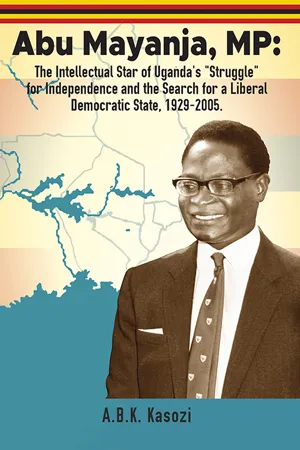
Abu Mayanja, MP
The Intellectual Star of Uganda’s “Struggle” for Independence and the Search for a Liberal Democratic State, 1929-2005
- English
- PDF
- Available on iOS & Android
Abu Mayanja, MP
The Intellectual Star of Uganda’s “Struggle” for Independence and the Search for a Liberal Democratic State, 1929-2005
About this book
This book, Abu Mayanja MP: The intellectual star of Uganda's "Struggle" for independence and the search for a liberal democratic state, 1929-2005, is a biography of a brilliant African politician, a history of a country and a continent told through the lens and activities of an individual politician.The book breaks new ground in how Uganda and Africa have been viewed by academic and popular opinion. Mayanja's life sheds light on the last days of colonialism and the early postcolonial history of Uganda and other African countries. First, although Africa, particularly Uganda, is viewed by popular imagination through the images of dictatorial and corrupt African leaders like Amin, Obote, Mubotu, Bokassa, Bongo and others, there were, and still are, voices of reason who advocated for the advantages of good governance.Secondly, it shows that it is not only heads of states who influenced the political direction of postcolonial states in the period just before and after independence. Other actors shaped the opinions of the masses and influenced how laws were formed and implemented. Thirdly, Mayanja is one of those public intellectuals who stood up to autocracy and what he thought should be done through words and actions.He analysed political and social issues at a higher conceptual level than almost all his contemporaries He was indeed the "intellectual star" of Uganda's "struggle" for self-rule and the nine years that followed independence. His ridiculing of those in power for their failure to know or understand governance issues landed him in prison and denied him full participation in governing the Uganda postcolonial state. But he left deep footprints on Uganda's and East African political thought. Had his suggestions for managing postcolonial Uganda been followed, the country would not have suffered as severely as it has since 1966.
Frequently asked questions
- Essential is ideal for learners and professionals who enjoy exploring a wide range of subjects. Access the Essential Library with 800,000+ trusted titles and best-sellers across business, personal growth, and the humanities. Includes unlimited reading time and Standard Read Aloud voice.
- Complete: Perfect for advanced learners and researchers needing full, unrestricted access. Unlock 1.4M+ books across hundreds of subjects, including academic and specialized titles. The Complete Plan also includes advanced features like Premium Read Aloud and Research Assistant.
Please note we cannot support devices running on iOS 13 and Android 7 or earlier. Learn more about using the app.
Information
Table of contents
- Front cover
- Title page
- Copyright page
- Dedication
- Contents
- Foreword
- Preface and Acknowledgement
- SECTION I MAYANJA IN THE UGANDAN POLITICAL LANDSCAPE, 1952–2005
- SECTION II MAYANJA’S POLITICAL THOUGHTS
- APPENDIXES
- Back cover